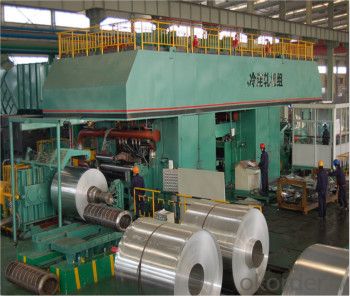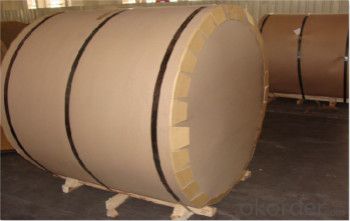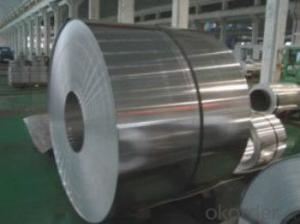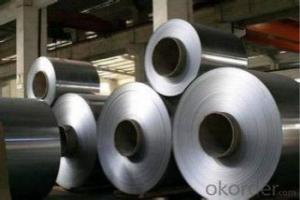Mill Finished Aluminium Coil AA8079 Temper H24
- Loading Port:
- Shanghai
- Payment Terms:
- TT OR LC
- Min Order Qty:
- 3 m.t.
- Supply Capability:
- 4000 m.t./month
OKorder Service Pledge
OKorder Financial Service
You Might Also Like
Item specifice
1. Aluminum Coil Description:
Aluminum coil, is a rolled product, produced in a coiled form of continuous strip, and having an ID (Inner diameter) and OD (Outer diameter).Common alloy coil are used for a wide variety of applications, alloy 1050, 1060, 3003, 3105, 3005, 5052, 5754, 5083, 6061, 8011, 8021, and so on, in thickness from 0.0065-7mm, in width from 300- 2200mm.
Aluminium coil can be deep processed into aluminium foilstock, aluminium circle, aluminium coating products, aluminium ceiling, aluminium plastic composite panel (APCP), aluminium embossed products, etc.
2.Main Features of the Aluminum Coil:
• Great ductility
• Heat conductivity
• Anti-corrosion
• Moisture resistanve
3.Aluminum Coil Images


4.Aluminum Coil Specification
Aluminum Coil/Sheet | |
Main Specification | |
Alloy | AA1xxx (AA1050, AA1060, AA1070, AA1100 etc.) |
AA3xxx (AA3003, AA3004, AA3005, AA3105 etc.) | |
AA5xxx, AA6XXX (AA5052,AA5083, AA5754, AA6061, AA6062 etc.) | |
AA8xxx(AA8011, AA8006, AA8079 etc.) | |
Temper | H14,H16, H18, H22, H24, H26, H32,O/F |
Thickmess | ≥0.2mm |
Width | 30mm-2100mm |
Standard | GB/T 3880-2006 |
Special specification is available on customer's requirement | |
5.FAQ
We have organized several common questions for our clients,may help you sincerely:
(1) How to guarantee the quality of the products?
We have established the international advanced quality management system, every link from raw material to final product. we have strict quality test; we resolutely put an end to unqualified products flowing into the market. At the same time, we will provide necessary follow-up service assurance.
(2) MOQ?
For trail order, we accept 3 MT.
(3) Payment term?
30% deposit, balance against the BL copy; 100% L/C at sight
(4) What is the delivery time?
Depends on actual order, around 30 to 35 days
- Q:Can aluminum coils be used in extreme weather conditions?
- Aluminum coils are capable of being utilized in the harshest weather conditions. With its exceptional durability and resistance to corrosion, aluminum proves to be a formidable material that can endure extreme heat, cold, humidity, as well as heavy rain or snow. Notably, it finds extensive employment in essential areas where weather resistance holds paramount importance, including air conditioning systems, refrigeration units, and outdoor equipment. These coils are expressly engineered to possess remarkable strength and dependability, ensuring their suitability for deployment in severe weather conditions, all the while maintaining optimal performance and lasting durability.
- Q:What is the expected lead time for manufacturing aluminum coils?
- The expected lead time for manufacturing aluminum coils can vary depending on several factors. These factors include the complexity of the coil design, the size and quantity of the coils being manufactured, the availability of raw materials, and the production capacity of the manufacturing facility. In general, the lead time for manufacturing aluminum coils can range from a few weeks to several months. For standard-sized coils with a simple design and readily available raw materials, the lead time is usually on the shorter end of the spectrum. On the other hand, if the coils have a complex design or require specialized materials, the lead time may be longer. Additionally, the production capacity of the manufacturing facility plays a significant role in determining the lead time. Facilities with higher production capacities can typically manufacture and deliver aluminum coils more quickly than those with lower capacities. It is important to consult with the specific manufacturer to get an accurate estimate of the expected lead time for manufacturing aluminum coils. They will be able to assess the specific requirements of the project and provide a timeframe that aligns with those requirements.
- Q:Aluminum metal reacts with hydrochloric acid, HCl, to form hydrogen gas (H2) and a solution of aluminum chloride. Write and balance the equation. Can someone help I just dont get this Al2 + 6HCl → 3H2 + 2AlCl3 Al2 + 2HCl → H2 + 2AlCl 2Al + 6HCl → 3H2 + 2AlCl3 Al + 2HCl → H2 + AlCl2 6Al + 2HCl → H2 + 2Al3Cl
- 2NH4Cl+Ca(OH)2-CaCl+2NH3+2H2O 18 Zn+2Cl-ZnCl2+H2 19 F2+2NaCl-2NaF+Cl2 20 CaO+SO2-CaSO3 21 2CaSO3+O2-2CaSO4 22 2HgO-2Hg+O2 23 CH3OH-CO+2H2 24 2KNO3-2KNO2+O2 you put the question in wrong section. Answer the others by yourself. I have given lots of examples there.
- Q:Can aluminum coils be used for outdoor applications?
- Yes, aluminum coils can be used for outdoor applications. Aluminum is a highly versatile and durable material that can withstand various weather conditions and temperatures. It is resistant to corrosion, making it suitable for outdoor environments where moisture and humidity are present. Additionally, aluminum coils are lightweight, which makes them easier to transport and install in outdoor settings. They are commonly used in outdoor applications such as roofing, siding, gutters, and HVAC systems. Overall, aluminum coils are a reliable choice for outdoor applications due to their strength, corrosion resistance, and longevity.
- Q:Are aluminum coils suitable for low-maintenance applications?
- Yes, aluminum coils are suitable for low-maintenance applications. Aluminum is a durable and corrosion-resistant material, requiring minimal upkeep. It does not rust, is resistant to weathering, and can withstand harsh environments. Additionally, aluminum coils are lightweight and easy to handle, making them a convenient choice for low-maintenance applications.
- Q:What are the different coil transportation options for aluminum coils?
- There are multiple transportation options available for aluminum coils, each offering their own advantages and suitability depending on various factors. These include: 1. Utilizing flatbed trucks: Commonly employed for aluminum coil transportation, flatbed trucks feature an open top and a flat, open trailer bed. To ensure secure transportation, the coils are firmly strapped or banded onto the bed, minimizing any potential movement. 2. Employing coil racks: Specifically designed for carrying aluminum coils, coil racks are specialized transportation equipment typically made of steel. These racks are placed within trucks or trailers, enabling the coils to be stacked and held in place by dividers, ensuring no shifting or damage occurs. 3. Opting for coil trailers: Specifically created for the transportation of aluminum coils, coil trailers possess a unique coil cradle system designed to securely hold the coils during transit. These cradles are adjustable, accommodating various coil sizes and preventing any potential movement or harm. 4. Considering container shipping: Another alternative for aluminum coil transportation involves the use of shipping containers. By loading the coils into the containers and securing them with straps or bracing, this option is frequently utilized for international transportation due to the ease of loading containers onto ships or trains. 5. Selecting rail transport: Rail transport presents an additional option for aluminum coil transportation, particularly for long-distance journeys. Specialized rail cars, known as coil cars, incorporate cradles or racks to securely hold the coils throughout the transit. This method is often chosen for its cost-effectiveness and efficiency. Ultimately, the selection of a suitable coil transportation option is dependent on factors such as distance, cost, and the specific requirements of the coils being transported.
- Q:How do aluminum coils perform in saltwater environments?
- Due to their innate resistance to corrosion, aluminum coils exhibit exceptional performance in saltwater environments. Unlike other metals, aluminum develops a protective oxide layer upon exposure to saltwater, effectively creating a barrier that prevents further corrosion. This durable and long-lasting oxide layer acts as a shield against the harsh effects of saltwater, guaranteeing the longevity and efficiency of aluminum coils in marine applications. Furthermore, the lightweight nature and high thermal conductivity of aluminum coils make them widely favored for use in heat exchangers and condensers within saltwater-based cooling systems. In conclusion, aluminum coils are extensively relied upon and highly efficient in saltwater environments, establishing them as the preferred choice for a range of marine applications.
- Q:Two days ago, my cocker spaniel ate most of a small aluminum bread pan--the disposable kind you can buy in the supermarket. The pieces I picked up when I discovered what he'd done were sharp, so I called the vet (right before closing), who recommended just keeping an eye on him for nausea, diarrhea, etc. The next morning I brought the dog and he showed no discomfort, but the vet put him on an antibiotic (esp. for gastric problems) just in case. It's been 48 hours, and the dog's still happy and eating and drinking, and when we go for a walk, his poo is fine (yep; I examine it!) ... if he's passed the aluminum, it must have been in the back yard when he was out on his own, and not on a walk. However, I'm still very anxious. At what point can I draw a sigh of relief? Thank you!
- Aluminum will pass just like food. It will empty from the stomach and go through the digestive tract. Hopefully he chewed up the pieces so that they are small and are at no risk of cutting his intestines or bowels. But if he is not yet showing discomfort, all should be well. You made the smart choice and called the vet, and if they do not seem too worried you shouldn't be either unless your pooch begins acting differently or seems to be in discomfort.
- Q:What are the typical thickness tolerances for aluminum coils?
- The typical thickness tolerances for aluminum coils depend on the specific application and industry standards. However, in general, the thickness tolerances for aluminum coils can range from +/- 0.002 inches to +/- 0.005 inches.
- Q:Are there any limitations on the coil flatness of aluminum coils?
- Aluminum coils, like other metal coils, have limitations on their flatness. The flatness of a coil refers to the extent to which its surface deviates from being completely flat. The American Society for Testing and Materials (ASTM) has set standards for measuring and evaluating the flatness of metal coils, including aluminum coils. These standards provide guidance for manufacturers, suppliers, and customers in determining the acceptable level of flatness for a particular application. The acceptable flatness of aluminum coils can vary depending on factors such as coil thickness, aluminum grade, and intended use. Thinner coils generally have stricter flatness requirements than thicker ones due to their greater susceptibility to distortion and waviness. Coil manufacturers employ various techniques, such as tension leveling, roller leveling, and corrective leveling, to control and improve flatness. These processes help to minimize or eliminate any deviations in flatness that may occur during coil manufacturing or processing. It is important to understand that achieving perfect flatness in aluminum coils is not always possible due to the inherent properties of the metal. Aluminum tends to exhibit some degree of natural springback, which can result in slight variations in flatness. However, these variations typically fall within acceptable tolerances for most applications. Ultimately, the limitations on the flatness of aluminum coils depend on the specific requirements of the customer or industry. Effective communication and clear establishment of flatness specifications between manufacturers and suppliers are crucial to ensuring that the coils meet the desired quality standards.
1. Manufacturer Overview |
|
|---|---|
| Location | |
| Year Established | |
| Annual Output Value | |
| Main Markets | |
| Company Certifications | |
2. Manufacturer Certificates |
|
|---|---|
| a) Certification Name | |
| Range | |
| Reference | |
| Validity Period | |
3. Manufacturer Capability |
|
|---|---|
| a)Trade Capacity | |
| Nearest Port | |
| Export Percentage | |
| No.of Employees in Trade Department | |
| Language Spoken: | |
| b)Factory Information | |
| Factory Size: | |
| No. of Production Lines | |
| Contract Manufacturing | |
| Product Price Range | |
Send your message to us
Mill Finished Aluminium Coil AA8079 Temper H24
- Loading Port:
- Shanghai
- Payment Terms:
- TT OR LC
- Min Order Qty:
- 3 m.t.
- Supply Capability:
- 4000 m.t./month
OKorder Service Pledge
OKorder Financial Service
Similar products
New products
Hot products
Related keywords





























